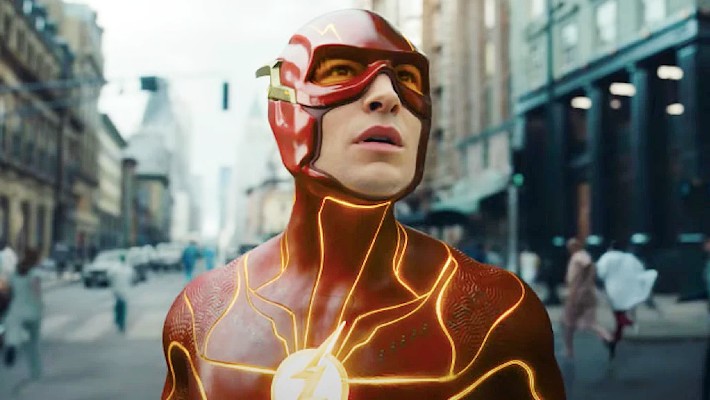Movie Reviews
’The Flash’ Reviews Are In And It Looks Like A Surprisingly Fun Time

Despite all the legal trouble surrounding The Flash star Ezra Miller, Warner Bros. Discovery has held strong on delivering the superhero blockbuster to theaters after the film reportedly wowed audiences in test screening. (It probably didn’t hurt that Michael Keaton’s Batman is along for the ride.)
With the film’s release just a little over a week away, critics have finally had a chance to see The Flash and the big question is whether it lives up to the hype that’s been building over the past few months. The answer… kinda.
While most of the reviews are positive, The Flash appears to fall victim to the same problem as virtually every single superhero movie these days: A convoluted, CGI mess of a final act. There are also mixed reactions as to how well The Flash basically offers up DC’s version of Spider-Man: No Way Home and whether audiences really need another multiverse film.
You can see what the critics are saying below:
Mike Ryan, Uproxx:
What makes Andy Muschietti’s The Flash a great movie (written by Christina Hodson, who also wrote Bumblebee, and has a knack for turning big-budget summer movies into stories with heart) is it’s not about saving the universe. Well, it sort of is, but that’s kind of secondary to Barry just trying to save his mom. Personally, I can’t really relate to saving a universe. It’s such a big thing, it doesn’t really matter. But as the movie gets deeper into Barry’s love for his mother, this is something, as humans, we can relate with and turns The Flash into a surprisingly heartfelt and emotional movie.
David Rooney, The Hollywood Reporter:
Director Muschietti handles the action with confidence. But like the conflict between Barry’s superhero exploits and his soulful attempt to mend the broken heart that has suspended him in arrested adolescence, the film often feels torn in two opposing directions. It’s strongest when its focus remains personal, an aspect embedded in Miller’s deftly layered performance and reflected in the corresponding sadness of Keaton’s Bruce Wayne/Batman. The early word on The Flash calling it one of the greatest superhero movies ever made was pure hyperbole. But in the bumpy recent history of the DC Extended Universe, it’s certainly an above-average entry.
Owen Gleiberman, Variety:
Ezra Miller has never gone full Ezra Miller the way they do in “The Flash.” With sculpted dark brows, almond eyes, and insinuating lips, the actor is a mesmerizing camera subject, like the young Jimmy Fallon crossed with the young Bob Dylan. But it’s the voice that gets you. In “The Flash,” Miller is insouciant, irritated, irascible and irresistible, like Andy Cohen on a bender of high anxiety. Just watching Barry order an elaborate peanut butter sandwich in the opening scene, with his hungry jitters and nervous speed-demon élan, is mesmerizing. With the possible exception of Deadpool, no straight-as-an-arrow DC or Marvel superhero has exhibited this level of psycho flippancy, this antic dissociation from his own heroism.
Pete Hammond, Deadline:
Let’s give credit to director Andy Muschietti and screenwriter Christina Hodson for making what was becoming a worn out movie genre a brand new life with a smart, funny, thrilling, emotional, and altogether swell take on a character that has been around 80+ years, but until now never got the showcase he deserves. And bringing him vividly alive in a rich and dazzlingly dual performance in which he brilliantly plays opposite himself is Ezra Miller, and simply put, better casting you could not imagine. Whatever the well-publicized previous troubles the actor had in his own life simply do not matter here, he is the real deal and a superhero superstar is born.
Christian Holub, Entertainment Weekly:
Viewers who enjoy Miller’s take on the character are thus welcome to a double serving (several scenes in the film consist of this one actor talking to themselves), while those who get easily annoyed by performative eccentricities might find it a lot to take. The upside is that, in the alternate reality created by Barry’s time travel, Michael Keaton is still Batman.
Rachel Leishman, The Mary Sue:
There are simply too many multiverse stories out there, and The Flash falls victim to being the lesser of the Flashpoint stories. A movie that thrives on the nostalgia bait laid out with Michael Keaton’s return as Bruce Wayne, it’s frankly a mid-level watch after seeing something like Spider-Man: Across the Spider-Verse. And maybe the near-hysteric level of unnecessary hype ruined my viewing experience of it, so temper your expectations and you might have more fun. The Flash is far from the “best superhero movie” title that had been thrown around by audiences and critics after CinemaCon. It is, in a way, fine—not “bad” fine, not “great” fine. Just fine.
William Bibbiani, The Wrap:
Andy Muschietti (“It”) directs clean, bright, mostly satisfying action sequences, at least up until the film’s epic finale, which takes place entirely against a backdrop of a beige desert. One can’t help but look at this action sequence, which might as well be set in limbo half the time, and remember the immortal words of John Ford at the end of “The Fabelmans,” as yelled by David Lynch: “When the horizon’s in the middle, it’s boring as sh*t.”
Joshua Yehl, IGN:
Fresh, funny, and fast – The Flash is a good time at the movies. Director Andy Muschetti’s clear love of the character anchors the many refreshingly unique action scenes and twisty time-travel plot, never losing sight of Barry Allen’s powerful emotional journey. Though the story doesn’t necessarily justify its excessive fan service and the third act is a bit unwieldy, that doesn’t stop The Flash from being an earnest and entertaining superhero film – and one of the better efforts from DC in recent memory.
The Flash races into theaters on June 16.

Movie Reviews
Movie Review: BRING HER BACK

Movie Reviews
The Verdict Movie Review: When manipulation meets its match

The Verdict Movie Review: The best chess matches happen when both players think they’re winning, and The Verdict serves up exactly that kind of strategic showdown wrapped in courtroom proceedings. Director Krishna Shankar’s thriller, set entirely in the US and half in English, starts as a conventional murder trial before revealing itself as something more cunning – a battle of wits where the real game begins after the gavel falls.
The film opens with Namrutha aka Nami (Sruthi Hariharan) facing trial for the murder of wealthy Miss Eliza Sherman (Suhasini Maniratnam) in an American courthouse. These early courtroom scenes, following US procedural conventions with jury deliberations and cross-examinations, feel distinctly theatrical. The dialogue sounds more like position statements than actual conversation, coming across as stiff portraits rather than living drama. Maya Kannappa (Varalaxmi Sarathkumar), Nami’s formidable attorney, works through these proceedings with visible competence, though even her presence can’t entirely mask the procedural dryness that makes you check your watch.
Thankfully, the real movie emerges post-acquittal. Nami reveals herself as more than just a defendant – she’s a strategist who suspects her nurse husband Varun (Prakash Mohandas) orchestrated Eliza’s death for inheritance money. Through flashbacks, we see Eliza’s genuine bond with Nami, making her murder more personal and calculated. Suhasini Maniratnam brings gravitas to these glimpses, creating a fully-realized character despite limited screen time. Even Raphael, Eliza’s long-time caretaker, becomes a pawn in this game, manipulated by Varun to provide false testimony that nearly seals Nami’s fate.
What transforms the film is the alliance between three women against one manipulative man. When Pragya, Varun’s pregnant colleague, realizes his true nature after he casually suggests abortion as a first response to her news, she becomes the third player in this game. The dynamics shift as Nami, Maya, and Pragya orchestrate an elaborate trap using the early COVID pandemic as cover. It’s here that the initially plastic characterizations start to make sense – these people were always performing for each other, hiding their true intentions behind carefully constructed facades.
The film’s strength lies in how it treats manipulation as a double-edged sword. Varun believes he’s the puppet master, but the women around him have been pulling different strings all along. Using his arrogance against him, they create a scenario where his need to boast becomes his undoing. The recording scene where Varun confesses his crimes to Maya, believing her to be another conquest, is particularly well-executed – a predator caught by his own vanity.
Varalaxmi Sarathkumar commands every scene as Maya, bringing both legal authority and street-smart cunning to her role. She’s the film’s anchor, making even the stiff courtroom sequences watchable through sheer presence. Sruthi Hariharan impressively navigates Nami’s transformation from victim to victor, while Prakash Mohandas delivers a compelling performance that truly comes alive in the second half. The supporting cast are adequate.
Krishna Shankar shows promise in handling the thriller elements, particularly in the second half where psychological warfare replaces legal procedures. The screenplay excels at revealing character through action rather than exposition – watch how each person reacts when cornered, and you’ll understand who they really are. The film cleverly positions its reveals to maximize impact, letting us discover alongside the characters that trust is the most dangerous game of all. After all, Varun himself is the real infection that needs eliminating.
The Verdict works best when it abandons the courtroom for the messier arena of human duplicity, where justice wears a different face entirely. It’s a reminder that sometimes the best verdict isn’t delivered by a jury but orchestrated by those who refuse to remain victims.
Written By: Abhinav Subramanian
Movie Reviews
Tornado movie review & film summary (2025) | Roger Ebert

You’d be forgiven if you glanced at the monotonous western “Tornado” and decided that it’s a handsome genre exercise. The movie, which was shot in Scotland and set in 1790s Britain, follows a handful of laconic characters as they chase after each other for the usual formulaic reasons: gold and revenge. Writer/director John Maclean (“Slow West”) reteams with director of photography Robbie Ryan (“Poor Things”) for a typically attractive collaboration, which makes “Tornado” easy enough on the eyes. That helps considerably whenever the action lets up in this dialogue-light chase movie.
Substantive themes are hinted at throughout, though they’re most clearly (and bluntly) articulated in the movie’s load-bearing dialogue between the title heroine (Kōki), a samurai-sword-wielding teenager, and her father Fujin (Takehiro Hira), a traveling puppeteer. By contrast, Tim Roth and “Slow Horses” star Jack Lowden, playing a father/son duo of scruffy bandits, don’t say much that sticks in one’s mind.
“Tornado” also features a number of eye-popping images thanks to the filmmakers’ emphatic use of forced perspective. The movie may not deliver enough of what its creators offer, but to paraphrase the great Bugs Bunny during a rare self-justifying apology: So it’s mechanical!
Maclean’s latest—his first feature in ten years—begins mid-chase. The title character flees from vicious robber Sugarman (Roth) and his gang, whose members have Dick Tracy-esque names like Squid Lips (Jack Morris) and Lazy Legs (Douglass Russell). Sugarman’s looking for Tornado and a cache of gold; Sugarman’s son, Little Sugar (Lowden), mostly skulks about and looks for opportunities to prove himself. He finds one in Tornado, though he mostly hangs back and lets his dad and his associates go first.
Meanwhile, Tornado tries to resume her uneasy day-to-day routine with her father, whose home-spun wisdom falls on deaf ears. Admittedly, it’s hard to take seriously folksy dialogue like, “Learn patience. Know when to move and when to wait.” This might have been more endearing coming from the Teenage Mutant Ninja Turtles’ talking rat mentor Splinter. It’s less impressive coming from a major supporting character who seems to speak for Maclean, like when Fujin, speaking in character as one of his marionettes during a puppet show, explains why we never really learn why Sugarman and his group do what they do since they’re motivated by “the most evil of all reasons—no reason at all.”
Tornado, the daughter of a Japanese man and an absent European mother, only has a little more on her mind. Sugarman’s pursuit triggers her fight-or-flight instincts, and she has no time for her life-lesson-dispensing father. Tornado also happens to live in changing times, when immigrants are still treated like curious anomalies, and swords will soon be replaced with guns. A number of other qualities and storytelling values remain constant, as Maclean suggests when Fujin explains that puppet show audiences “always cheer when evil is winning.” It’s hard not to agree with Tornado when she snarks back: “Because good is boring.”
Then again, Maclean’s right to emphasize the ScottishBritish countryside, both as an eye-catching backdrop and contextualizing environment, since it often dwarfs his human characters and makes them look small or absurd. Many times, the deep focus of any given static camera setup establishes how far the characters have traveled to get from one in-between place to the next. Other times, it serves to show how close together the characters actually are, since they’re just over there, one straight, semi-symmetrical line of sight apart from each other. So it’s very easy to catch a melancholy mood and therefore to appreciate the movie’s sobering atmosphere, even if we’re still stuck watching sketchy characters trudge after and chip away at each other.
There’s also an unusual tonal clash at the heart of “Tornado,” and it’s as apparent as the movie’s suggestive title: Kōki’s young heroine doesn’t simply represent one identity or mood, as a later line of dialogue explains. Maclean’s dramedy likewise features antic comedy, as in an early pratfall involving weak floorboards and a large, heavy named Kitten (Rory McCann), as well as suggestive images of an indifferent, but stunning autumnal landscape. The lighting and the editing in this movie are appealing enough to make you want to get lost in each carefully composed frame. The wispy dialogue, variable tone, and creeping pace make it harder to care.
Maclean’s execution frequently makes up for his distracting habit of both over- and underthinking certain key concepts. He and his collaborators still know how to achieve the effects they set out to. So your enjoyment of “Tornado” depends on how much you want to root for thinly drawn characters who don’t look strong enough to carry an entire movie. They can and they can’t, depending on how patient you’re feeling.
-

 News1 week ago
News1 week agoRead the Full ‘Make America Healthy Again’ Report
-

 Technology1 week ago
Technology1 week agoNow you can watch the Internet Archive preserve documents in real time
-

 Technology1 week ago
Technology1 week agoDiscord might use AI to help you catch up on conversations
-

 Science1 week ago
Science1 week agoTrump Has Cut Science Funding to Its Lowest Level in Decades
-

 World1 week ago
World1 week agoNeo-Nazi cult leader extradited to US for plot to kill Jewish children
-

 Movie Reviews1 week ago
Movie Reviews1 week agoMovie review: 'Dogma' re-release highlights thoughtful script – UPI.com
-
Movie Reviews1 week ago
Movie Review: 'Pee-wee as Himself' unmasks Paul Reubens
-

 Business1 week ago
Business1 week agoPlastic Spoons, Umbrellas, Violins: A Guide to What Americans Buy From China




















